Unit Four Public文秘英语课件
- 格式:ppt
- 大小:1.25 MB
- 文档页数:31

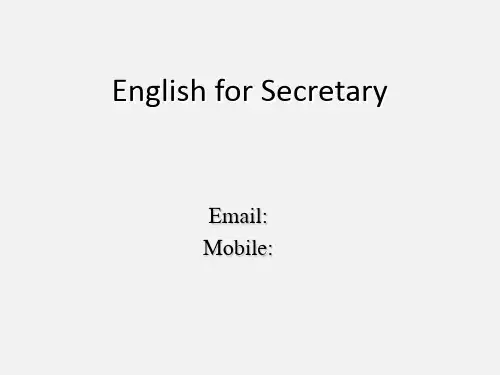
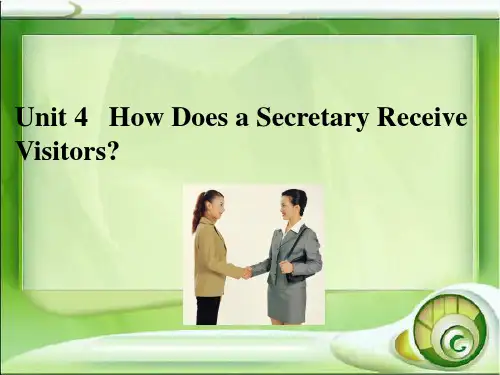


人教版高中英语unit4课件全文共3篇示例,供读者参考篇1Unit 4 of the People's Education Edition high school English textbook focuses on the theme of "wildlife protection". In this unit, students will learn about the importance of conserving wildlife, the threats facing various animal species, and what can be done to help protect them. The unit includes readings, listening exercises, writing tasks, and speaking activities to help students practice their English language skills while learning about this important topic.One key reading in this unit is a passage on the endangered giant panda. Students will learn about the habitat of the giant panda, the reasons for its decline in numbers, and the efforts being made to protect this iconic species. This reading will help students understand the impact of human activities on wildlife and the importance of conservation efforts.In addition to readings, students will also engage in listening exercises that focus on different aspects of wildlife protection. They will listen to interviews with conservationists, wildlifeexperts, and local communities to gain a deeper understanding of the challenges and successes in wildlife conservation.Writing tasks in this unit will allow students to express their own opinions on wildlife protection. They will be asked to write essays, letters, and reports on topics such as the role of zoos in conservation, the impact of climate change on wildlife, and the importance of sustainable development in protecting natural habitats.Furthermore, speaking activities will give students the opportunity to discuss these topics with their classmates and practice their oral communication skills. They will participate in group discussions, role-plays, and debates on issues related to wildlife protection, allowing them to express their ideas and listen to others' perspectives.Overall, Unit 4 of the People's Education Edition high school English textbook provides students with a comprehensive understanding of the importance of wildlife protection and the actions that can be taken to preserve biodiversity. By engaging with this unit, students will not only improve their English language skills but also develop a greater appreciation for the natural world and the need to protect it for future generations.篇2Unit 4 of People's Education Press High School English textbook is a comprehensive unit that covers various topics related to culture and festivals. In this unit, students will learn about different festivals celebrated around the world, as well as cultural traditions and customs associated with these festivals.The unit begins with an introduction to the concept of festivals and their significance in different cultures. Students will learn about the history and origins of various festivals, as well as how they are celebrated in different countries. This section also includes vocabulary related to festivals, such as decorations, rituals, and traditions.One of the main topics covered in this unit is Chinese festivals. Students will learn about traditional Chinese festivals such as the Spring Festival, Mid-Autumn Festival, and Dragon Boat Festival. They will explore the customs and traditions associated with these festivals, as well as the stories and legends behind them.In addition to Chinese festivals, students will also learn about festivals from other countries, such as Christmas, Easter, Diwali, and Thanksgiving. They will compare and contrast the customsand traditions of these festivals, as well as the similarities and differences between them.The unit also includes a section on cultural exchange programs and activities, where students can learn about different cultures and traditions through experiential learning. This could include participating in cultural exchange workshops, attending cultural performances, or even visiting cultural landmarks.Overall, Unit 4 of the People's Education Press High School English textbook provides students with a comprehensive understanding of different cultures and festivals around the world. By studying this unit, students will develop a greater appreciation for cultural diversity and learn to respect and celebrate the traditions of others.篇3Unit 4 of the People's Education Press (PEP) high school English textbook covers a variety of interesting topics related to communication skills. In this unit, students will learn how to express opinions, make suggestions, agree and disagree, and give advice in English. The unit also includes vocabulary related to communication, such as expressions for agreeing anddisagreeing, phrases for giving advice, and words for describing emotions and feelings.One of the key objectives of Unit 4 is to help students improve their spoken and written communication skills in English. The unit includes a variety of activities and exercises designed to help students practice using the new vocabulary and grammar structures they have learned. For example, students may be asked to engage in role-playing exercises where they have to express opinions or give advice to a partner. They may also be asked to write short essays or dialogue scripts that demonstrate their understanding of the new language structures.In addition to improving communication skills, Unit 4 also introduces students to different cultural perspectives on communication. For example, students may learn about the importance of politeness and indirectness in communication in some cultures, while in others, directness and assertiveness may be valued.Overall, Unit 4 of the PEP high school English textbook is designed to be engaging and informative, providing students with the opportunity to practice and improve their communication skills in English while also learning about different cultural perspectives on communication. By the end ofthe unit, students should feel more confident in their ability to express themselves in English and engage in meaningful conversations with others.。
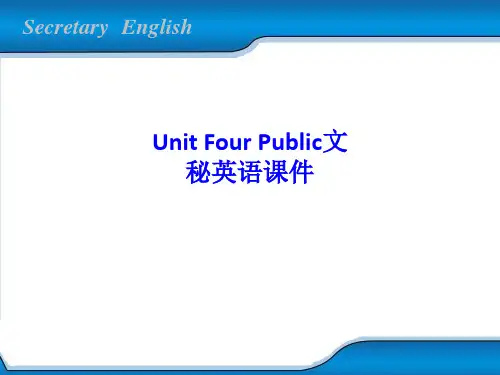
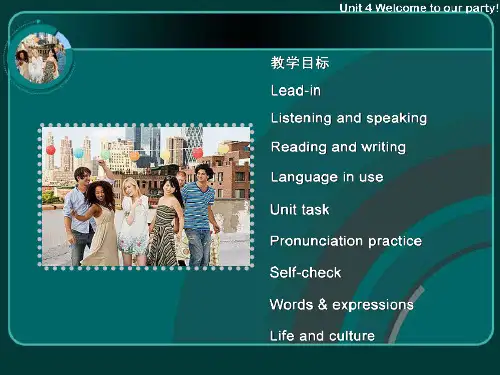

Key to Unit 4 How Does A Secretary Deal with Phone Calls? Section 1 Making & Answering Phone CallsI.Dialogue 11. calling2. 173. lake4. withoutDialogue 25. speak6. line7. busy8. supplyDialogue 39. moment 10. Tuesday 11. fineIII.3.1)about the order with us2)I’ll check Mr. Ling’s schedule3)Would Thursday be too late4)make an appointment for you for 9:305)confirm the appointment5.1)Does she have any time tomorrow?2)Would you please hold the line for a moment?3)Mr. Ling Yun has a full schedule tomorrow.4)I’ll make a note of that.5)You can contact me any day at 734 427, extension 347.6)Mr. Ling is rather busy now and would like to know what you wish tospeak to him about.7)Mr. Rollin is interested in importing Chinese textile products into theU.S.8)I’ll just check Mr. Ling Yun’s schedule, and see if I can arrange anappointment for you, just a moment.Section 2 Telephoning EffectivelyI.1. skills2. natural3. clear4. sound5. for6. avoid7. simply8. business9. help 10. person 11. secretary 12. losingIII.3.1) is determined 2) are 3) saying 4) sound 5) speaking6) to make 7) be transferred4.1)The customer’s impression of the company is determined completely by the speaker’s voice and choice of words.2)Take the chance to repeat them, particularly at the end of the call.3) A smile on your face is reflected in your voice.4)Prompt response will give your customer the impression that your company is very efficient.5)Simple things like these make all the difference when dealing with people over the phone.5. 1) False 2) False 3) True 4) True 5) FalseSection 3 Writing a Letter of CongratulationI.1. recruitment2. employee3. purpose4. introduce5. reference6. introductory7. full9. reason 10. description 11. appreciation 12. special 13. overdoIII.2.1) This will introduce Mike Blackman, our new sales representative.2) I would like to introduce you Doris White, our excellent Export Manager.3) She has been working with us for five years and we are delighted with her efficient way of dealing with office routine.4) You’ll find that she is an outstanding assistant to you during the exhibition.5) Could you please give Mike whatever guidance you can to get him started. I will appreciate it --- and so will Mike.Section 4 Getting to Know Diplomacy (1)I.1. Dictionary2. relations3. nature4.states5.ancient6. favour7. policies8. diplomacy9. political 10. known 11. kingdom 12. tripartite 13. themIII.3.1. true2. false3. true4. false5. false6. falseTapescritpsHow Does A Secretary Deal with Phone Calls?Section 1 Making & Answering Phone CallsDialogue 1A: Good afternoon. Is this Royal Hotel?B: Yes, Madam. May I help you?A:Yes. I’m calling from Oriental Trade Company. I need to make a reservation for Mr. Ling Yun.B: Fine, Madam. When will Mr. Ling arrive, and how many nights will he be staying?A: Mr. Ling will arrive in Detroit on Sep. 17 and stay there for three nights. And he would like a room with the view of the lake.B: Sorry, Madam, but all the rooms with the lake view have been reserved or Sep.17. Is it all right to have Mr. Ling in a room without a view for Sep.17 and then we can transfer him to a room with the lake view on Sep. 18?A: That sounds all right. Thank you very much.B: It’s my pleasure. Thank you for choosing Royal Hotel.Dialogue 2A:Mr. Ling Yun’s office. Good afternoon. Zhang Yi speaking.B: Hello. I’d like to speak to Mr. Ling Yun, please.A: May I ask who is calling, please?B: My name is Tom Rollin of Pacific International.A: Thank you, Mr. Pollin. One moment, please ...B: No, no. This is Rollin, not Pollin.A: I’m sorry, Mr. Rollin. Just a moment, please. (Over the intercom) Mr. Ling, a Mr. Rollin of Pacific International is on the line.C: Can you find out what he wants?A: Yes, Mr. Ling. (To Mr. Rollin) I’m sorry to have kept you waiting. Mr. Ling is rather busy now and would like to know what you wish to speak to him about.B: Yes, we want to import Chinese textile products into the United States and we understand that your company can supply us with such items. A: I see. Thank you very much, Mr. Rollin. Would you wait a moment, please? (To Mr. Ling) Mr. Ling, Mr. Rollin is interested in importing Chinese textile products into the U.S.C: I see. Put him in.A: Yes, Mr. Ling. (To Mr. Rollin) Mr. Rollin, I’m very sorry to have k ept you waiting. I’ll connect you with Mr. Ling.Dialogue 3A: Marketing Department, Zhang Yi speaking.B: Good morning. My name is Carter and I work for Standard Cars Ltd. of Birmingham, England. I’d like to speak to Mr. Ling Yun, please.A: I’m afraid Mr. Ling is not here at the moment. Can I help you, or would you like to speak to someone else in the Marketing Department.B: I’d like to make an appointment to see Mr. Ling Yun sometime next week.A: I’ll just check Mr. Ling Yun’s schedule, and see if I can arrange an appointment for you, just a moment. Yes, Mr. Ling seems to be available on Tuesday morning, Wednesday afternoon and Friday morning.B: Could I make an appointment on Wednesday afternoon, please?A: Could 2:30 be convenient for you?B: Yes, that’ll be fine. Thank you very much, goodbye!A: Goodbye.Dialogue 4A: Good Morning. Mr. Ling Yun’s office. This is Zhang Yi speaking.B: Hello, Miss Zhang. This is Henry James of Eastern Development Co. A: Hello, Mr. James. How may I help you?B: I’d like to see Mr. Ling Yun about the order with us. Does he have any time tomorrow?A: Would you please hold the line for a moment? I’ll check Mr. Ling’s schedule… Thank you for waiting. I’m sorry, but Mr. Ling Yun has a full schedule tomorrow and then he’ll be away the following day. Would Thursday be too late?B: Just a moment… Thursday’s OK if it’s in the morning.A: All right. I’ll make an appointment for you for 9:30. Would that be convenient for you?B: Yes, that’ll be fine.A: I’ll make a note of that. Would you like me to confirm the appointment? B: Yes, please. You can contact me any day at 734 427, extension 347.A: Fine, I’ll do that.B: Thank you very much. See you at 9: 30 on Thursday. So long.A: Goodbye. Mr. James.Section 2 Telephoning EffectivelyOn the phone the image of a company relies heavily on the speaker’s speaking skills. The customer’s impression of the company is determined completely by the speaker’s voice and choice of words. Telephoning skill is not a natural talent but a learned skill. Here are some tips to help a secretary make better communications through the telephone.Speak clearly and more slowly than usual. Be particularly clear when saying one’s name and the name of one’s organization, and take the chance to repeat them, particularly at the end of the call.Speak with more energy. Telephones tend to make one’s voice sound less lively as it really is, so try to give increased interest in and enthusiasm for what the secretary is saying.When necessary ‘smile with one’s voice’. A smile on one’s face is reflected in one’s voice, and will help the secretary avoid speaking in the same tone all the time.Be and sound polite, professional, understanding, helpful, and friendly. Much of the secret is simply good manners and attention. Be a good listener.Explain things in an understandable way. Don’t use special terms or assume that a customer knows the business or industry. The secretary should speak without accent to make the communication easier.Make it easy to be contacted. Customers shouldn’t have to talk to half a dozen people before they can find one who can help. They shouldn’t be given another number or told to call back later. Usually they should betransferred through to the right person, or if that’s impossible, th e right person should call them back.Respond promptly to phone calls. Prompt response will give a customer the impression that one’s company is very efficient. And if the secretary promises to call back, he or she should do this as soon as possible.Know how to use all the buttons on the phone, and in particular how to transfer a call without losing it. Simple things like these make all the difference when dealing with people over the phone.Section 3 Writing a Letter of CongratulationA: In today’s recruitment examination for secretary, we are required to write a letter to introduce a new employee to the company’s business associate. But I don’t think I’ve done a good job.B: Why not? A letter of introduction is not very difficult to write because the purpose of such a letter is only to introduce one person to another. It is not a reference letter to present a person's qualifications, so an introductory letter must be written to the point.A: What should be included in it?B: Three points are necessary for it. One is to provide the full name of the person being introduced. Second is to give an explanation for the purpose and reason of the introduction. Third is to make a very brief description of the person being introduced. Some letters may have a forth part to express the writer’s appreciation.A: Is there anything to pay special attention to?B: Well, maybe, when you describe the person being introduced, try to make him or her sound interesting rather than overdo the compliment. A: Ok, I see. Thank you very muchExample of letter of introductionDear Mr. Huxley,It’s our great pleasure to introduce to you Bob Sherman, our new sales manager, who became our colleague in August.Bob has a wealth of background in ceramic industries, including both manufacturing process and international trade practice. Not many people have such complete experience with the toys they are selling.We are delighted with Bob’s resourcefulness and we know you will soon find him helpful to your business.Best regards,Henry CollinsSection 4 Getting to Know Diplomacy (1)A: Do you know how diplomacy is defined?B:I can only tell you what the Oxford Dictionary says about it. It says, “Diplomacy is the management of international relations by negotiation; the method by which these relations are adjusted and managed by ambassadors and envoys.”A:I think this definition covers the nature and the content of diplomacy. In short, the substance of diplomacy is to adjust the relationship between states through negotiations which are mainly carried out by diplomats. .B: The word “diplomacy” comes from the ancient Greek word “diploma” which means a folded document used for identification and request for favour or privilege.A:What’s a diplomat? What do they usuall y do?B: A diplomat is a person who represents his/ her country in dealing with another country. They usually execute the foreign policies of the states they represent and learn the situation, external or internal, in the countries they are appointed to and serve as the eyes and ears of their governments in other countries.A: How about the origin of diplomacy? Anything you know about it?B: Well,diplomatic activities are found in all civilizations such as Chinese, Indian, Egyptian civilizations. Take China for example. During the period of the Warring States (beginning about the middle of the fifth century B.C.), a political and military alliance against the Kingdom of Qin known in history as “the Vertical Alliance” was formed by the Kingdoms of Qi, Chu,Yan, Han, Zhao and Wei. And a counter alliance, known as “the Horizontal Alliance”, was organized by Qin and its followers.A: In this sense, I think the Chibi Battle is another example of an ancient diplomatic activity. ZhuGe-liang was sent as the special envoy of Shu State to the Kingdom of Wu to effect a military alliance against Wei State which, as a result, suffered a crushing defeat in the battle, and this laid the groundwork for the situation of tripartite rivalry.B: You are absolutely right. These can be seen as some earliest forms of modern diplomacy and from them we can see how diplomacy has been done till now.A:Oh, there goes the bell. Let’s go to class.B: Yes, let’s.译文:秘书怎样接打电话第一部分对话1下午好,这是皇家宾馆吗?是的,夫人,可帮您做什么?我是东方贸易公司的,想为凌云先生订房。
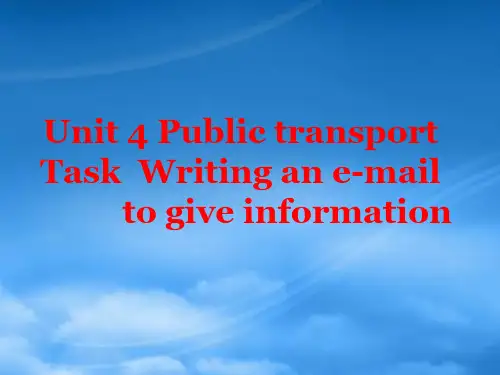
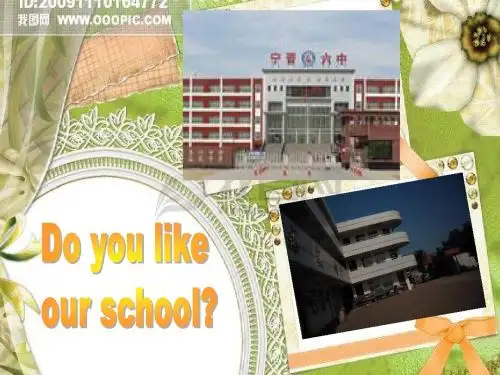

感顿市安乐阳光实验学校Unit 4 Public transpor 第一部分听力(满分30分,限时20分钟)第一节(共5小题;每小题1.5分,满分7.5分)听下面5段对话。
每段对话后有一个小题,从题中所给的A、B、C三个选项中选出最佳选项,并标在试卷的相应位置。
听完每段对话后,你都有10秒钟的时间来回答有关小题和阅读下一小题。
每段对话仅读一遍。
1.When did the alarm clock ring?A.At 6 o'clock.B.At 7 o'clock.C.At 8 o'clock.2.What does the woman want to do?A.Open the door.B.Let the man in.C.Open the window.3.What's the probable relationship between the speakers?A.Taxi driver and passenger.B.Driver and conductor.C.Boss and secretary.4.Where is Jimmy now?A.In a hotel.B.At home.C.In the lab.5.What will the woman do for the man?A.Wash his clothes.B.Get him a wallet.C.Take him to the store.第二节(共15小题;每小题1.5分,满分22.5分)听下面5段对话或独白。
每段对话或独白后有几个小题,从题中所给的A、B、C三个选项中选出最佳选项,并标在试卷的相应位置。
听每段对话或独白前,你将有时间阅读各个小题,每小题5秒钟;听完后,各小题给出5秒钟的作答时间。
每段对话或独白读两遍。
听第6段材料,回答第6、7题。
6.What does the man usually do at night?A.He studies his lessons.B.He listens to music.C.He watches a film on TV.7.What does the man usually do on weekends?A.He goes to parks.B.He goes to ball games.C.He goes shopping.听第7段材料,回答第8、9题。